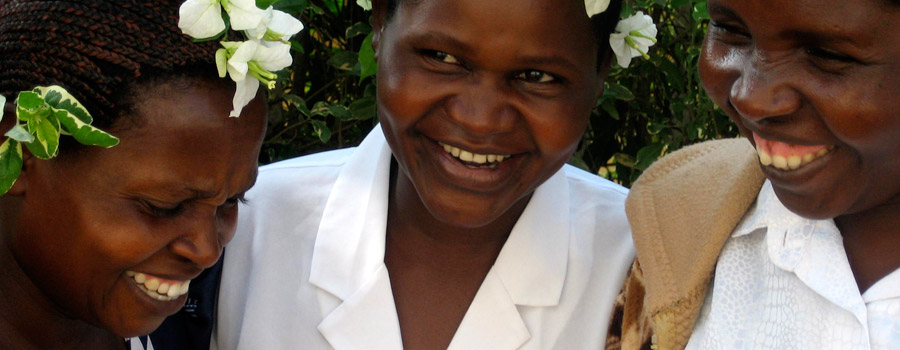Preventing Fistula : at the Community Level :
Resources & Tools
Curricula and Training Modules
Promoting Maternal Health and Preventing Obstetric Fistula: A Training Curriculum for Village Health Teams in Uganda
This training manual is designed to complement and reinforce existing training materials for village health teams (VHTs) in Uganda. It builds upon the content of the Uganda Ministry of Health’s existing training materials for VHTs and provides additional content and tools to support VHTs in their efforts to monitor and promote maternal health in their communities. The four-day training workshop equips members of VHTs with the knowledge, skills, and tools they need to promote healthy practices before, during, and after childbirth and to monitor maternal health care–seeking and pregnancy outcomes in their communities.
Files: English (PDF, 1.7MB)
Communities for Improving Maternal Health: A Guide to Training Village Committees in Maternal and Child Health in Guinea
This five-day training guide was developed in Guinea to give village safe motherhood committees the knowledge, ability, and tools necessary to spread awareness within their community of the risks of pregnancy and childbirth, including obstetric fistula, in addition to promoting maternal health through access to care before, during, and after childbirth. In particular, the training focuses on three problems linked to poor maternal health: giving birth at home without access to skilled care in an emergency; lack of antenatal care and preparation for childbirth; and poor engagement of men during pregnancy and childbirth.
Files: French (PDF, 1.8MB)
Training Session for Health Workers on Prevention and Recognition from Ethiopia
Fistula Care's implementing partner in Ethiopia, IntraHealth International, has developed materials to train health care workers on obstetric fistula prevention, identification, and pre-repair care. The course contains a participant handbook, a facilitator manual, 10 modules, a variety of visual aids, and supplementary handouts. (All items are in English.)
- Facilitator Manual (PDF, 797KB)
- Participant Handbook (PDF, 604KB)
- All 10 module presentations (English, PDF, 3.3MB) and Module 4's Cards for Facilitators (English, PDF, 69KB)
Training Manual for Community Liaisons from Niger
This training manual, developed in Niger, is designed to enhance the knowledge of community liaisons on maternal and newborn health, including: the status of maternal and newborn health globally and in Niger; health services to promote maternal and newborn health; skilled birth attendance and danger signs; family planning; and obstetric fistula. The training manual also addresses communication techniques to promote maternal and newborn health. The participant handbook was designed to facilitate awareness-spreading activities of community leaders in maternal and neo-natal health as well as obstetric fistula. (All items are in French.)
- Training Manual (PDF, 241KB)
- Participant Handbook (PDF, 213KB)
Evaluation and Research Studies
Evaluation of Community-Level Fistula Prevention Interventions in Guinea
The purpose of the evaluation was to explore whether the establishment and support of Village Safe Motherhood Committees led to measurable outputs in terms of enhanced community capacity and support systems and whether enhanced community support systems were associated with desired population-level outcomes, such as knowledge about obstetric risks, birth preparedness, and use of maternal health services. The study showed measureable differences between intervention and comparison villages in terms of community capacity—namely, the knowledge and activities of community-level committees and individuals involved in maternal health promotion. In addition, significant differences were observed at the population level in terms of women's exposure to community-level maternal health promotion efforts and their knowledge about maternal health and obstetric fistula.
Files: English (PDF,
978KB) and French (PDF, 1.0MB)
Technical Briefs
Increasing Access to Maternity Services in Rural Bangladesh: Sustainable Facility-Community Links
The Ad-din Hospital for Women and Children and the LAMB Project in Bangladesh have established community-level services for women in rural, underserved communities. This technical brief describes their noteworthy programs, which ensure community ownership and sustainability. One program is integrated into a microfinance program to enable financial independence; the other empowers community members to truly own and manage its services.
Files: English (PDF,
1.1MB) and French (PDF, 1.2MB)
Low-Cost Ambulance Network to Provide Access to Maternity Services in Dhaka, Bangladesh
Transportation to skilled maternity care is critical. In 2008, the Ad-din Hospital recognized that many women in Dhaka were unable to access emergency obstetric care and established a low-cost ambulance service. This technical brief describes how Ad-din uses mobile phones and global positioning system (GPS) tracking to manage a fleet of ambulances stationed throughout the city.
Files: English (PDF,
736KB) and French (PDF, 781KB)
Beyond Repair: Involving Communities in Fistula Prevention and Reintegration—Experience from Kissidougou, Guinea
This brief discusses engaging local government and community members in treatment and prevention of fistula and reintegration of fistula survivors.
Files: English (PDF, 1.7MB) and French (PDF, 3.3MB)
Tools
Digital Stories Facilitator's Guide
This guide serves as a companion to the Learn From My Story series, a collection of video testimonies from fistula clients in Uganda. To help people listen to and use the stories, a facilitator's guide was created and includes: the text of each woman's story, discussion questions tailored to each woman's story, and key messages for facilitators to convey. The guide is intended for use with three main audiences: health care providers, women with fistula, and community members.
Files: English (PDF,
2.8MB) and French (PDF, 2.7MB)
Maternal and Newborn Health Picture Books from Niger
Picture books developed by the Fistula Eradication Network (Reseau pour l'Eradication des Fistules) in Niger provide guiding questions for providers to use in discussing issues relating to safe motherhood with clients. These include antenatal and postnatal care, vaccinations, birth preparedness, malaria in pregnancy, danger signs for mothers and newborns, prevention of mother-to-child transmission of HIV, and care and nutrition for newborns.
Version 1: French (PDF, 6.0MB)
Version 2: French (PDF, 2.5MB)
![[ Skip Navigation ]](../../data/images/c.gif)



